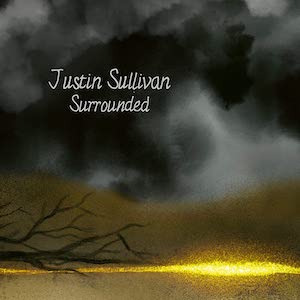
Justin Sullivan – Surrounded
Attack Attack – 28 May 2021
Formed in 1980, standard-bearers of the anarcho-folk movement, New Model Army have racked up 15 albums in their career to date. However, after releasing his solo debut, Navigating By The Stars, back in 2003, it’s only now that frontman Justin Sullivan has got round to a second.
A product of but not related to lockdown, featuring Sullivan with contributions from fellow NMA members, bassist Jon Thorne, Florence and the Machine harpist Tom Moth and various string arrangements, the 16 songs written in the early part of the pandemic last year are less about social and political comment and more drawn from autobiography and invention and real-life stories.
Gregorian-like humming opens proceedings with the succinctly titled Dirge, instruments gradually filtering in. It’s almost two minutes before he sings, or rather intones any lyrics around a theme of wilful isolation (“I’m still up on my mountain./Unwilling to come down”) accompanied by what sounds like a Chinese bell.
Throughout, Sullivan’s vocals have an up-close, almost claustrophobic intimacy that and the predominantly sparse arrangements often, as on that track, conjuring an atmosphere redolent of dank, fecund vegetation. In contrast, however, the subsequent track has more of an edgy, neurotic soundscape. Although I assume there’s no relation, the opening features vocals by Laura Shackleton and, on his last album, Sullivan explored the story of Ernest Shackleton in Ocean Rising, and here continues his fascination with Antarctic adventurers with Amundsen, sung in the voice of the Norwegian explorer, the first to reach both the South and the North Pole, as he declares “This is what I’ve learned/Never trust in the ice/Never trust in the wind/Never trust in people/Make good preparations/It’s only the dogs that are faithful”.
That sense of gloom and melancholy pervades several numbers; on the minimal strum of Coming With Me, he takes on the persona of a suicidal pilot, presumably taking his passengers with him, while mental turmoil weaves through the skeletal Bowie shades of the cello-embellished Clean Horizon (“In the long and broken night/sticky with the bad dreams/You see the faces of the past floating downstream/Like thieves coming in the dark to steal away your halo”) and, in the slightly more strident god-deserted Unforgiven with violins by Henning Nügel, “In the village there are more dead tan there are living” with the “motorbikes and oil-stains from ride-by killings”.
The track has a reference to slavery, which is also echoed in the more delicately fingerpicked waltzing Akistan with its image of the ghost silhouettes of slave ships as the lyric unfolds, again to a hummed backdrop, a stance on non-violent defiance as the narrator says, “They looked at me like they could not understand/That I’d die for a cause but not kill for it”.
Especially intoxicating is the ghostly, otherworldly portrait he sketches in the spoken Sao Paulo with its upright bass, harp and vibraphone as he observes how thin is the line between this world and the spirit world on what is likely the only song ever to reference ayahuasca, a South American psychoactive brew used among the Amazon tribes for spiritual medicine purposes.
Elsewhere, however, the mood, though remaining overcast, is lighter as the songs embrace themes of images of transcendence and the bonds of family, both genetic and forged, as in the early Cohen-evoking strummed 28th May (which may or may not be a reference to the day the Spanish Civil War ended) as he sings “if you have no clan, then what are you?” and of the “ghosts of martyrs that must be honoured” and talk of the sacred soil. Likewise, the stirring Stone And Heather with its violins and guitar drones that use the imagery of the land and the roots that bind us to it in the line “some people have a landscape written in their bones”.
Another number woven around a date, arranged for cello and violin, the enigmatic 1975, is heavy with a sense of regret and loss (“The golden dream faded away/The pictures browned and blurred”), seeing “no reflection in the mirror”. But, in contrast, Sea Again shimmers with optimism, the taste of salt upon the skin, likewise extending the imagery to Rip Tides concerning the power of love while, again caressed by harp, Daughter Of The Sun, returns to the theme of transcendence, emerging from the darkness “into the morning light/I come to be kissed by the daughter of the sun”.
Perhaps the most obvious response to the pandemic is the folksy fingerpicked and dulcimer accompanied Clear Skies (“there is still no word from the front”), one of the album’s strongest and most memorable tracks, that surely has Jackson Browne in mind with lyrics that refer to “before the arriving of the deluge” and “the miracle of running on empty”.
It ends on a high, bass and harp accompanying Sullivan on the reminiscences of the relatively jaunty jogging Ride (“I sat back in my seat and smiled to myself/I’ll take what’s coming and let Old Fate decide”), set at a New Orleans funeral that may or may not intentionally rhythmically nod to Iggy’s The Passenger, before, finally, closing with the calm, piano, flute and cello accompanied title track, which, with its mention of ice, snow and yelping dogs, seems to link back to Amundsen, but is essentially a number about grace, epiphany and the ties and bloodlines that bind us together in the glorious image of being “surrounded by all the light that I will ever see”. An album that needs you to spend time in its company, letting it seep into the blood and soul rather than sending you to man the barricades, there’s a depth of emotion, despair and hope, darkness and light that captures both the isolation of lockdown but also the sense of a universal bond that it has awoken.
Order via: https://justinsullivan.tmstor.es/
Photo Credit: Thibaut Lafaye
